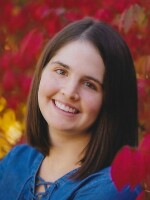Hope Schust is a masc, non-binary queer person who was born in Kenya. They spoke about how music impacts their life – allowing them to express their emptions and find solace in the midst of life’s changing environments.
Alphabet Soup shares LGBTQ+ Missourians’ stories through portraiture and personal narratives.
Hope Schust: I think I've always been very queer, and I never really learned the terminology for it until like, maybe third grade or so.
But in elementary school, it started very – I was very confident. I knew that I wanted to wear pants at school, and I knew that I wanted to be called a tomboy.
And then, I think in middle school when I wasn't at private school anymore, and everyone kind of wore what they wanted to – I started to lose some of that confidence.
Not everyone, you know, was invited to everyone's birthday party anymore. Things got a little more separated, and so, I started to lose some of that gender, masculine confidence.
But I think throughout my whole life, I've always been pretty sure about my gender. It was a very welcoming environment at home.
It was a very welcoming environment at home. When I was a kid, I realized I wanted to play basketball, and it just felt like that. I was like, “Hey, Mom, I want to play basketball.” It’s the same thing. It's like, “Oh, I realized I like women.” It was like, “Oh, mom, by the way, I have a crush on this girl,” and it was just like any other day.
Well, I was born in Nairobi, Kenya, and then I was adopted and brought to America, and, yeah, I think being Kenyan is something that I really want to hold on to because I'm so far away from Kenya, sometimes it feels like I am losing part of my identity, but I try to hold on to it in the way of music.
![A cajon box drum, left, and a djembe drum, center, sit atop a weighted keyboard in Hope Schust’s room on Friday, April 12, 2024, at their apartment in Columbia. Schust was born in Kenya and said playing the djembe, which has West African origins, makes them feel closer to their African roots. They said the cajon is one of their favorite percussive instruments, “and it’s always a very full body experience when I play on it.”
“I got [the piano] when I was 7 or 8. I’ve had it most [of] my life. It’s where I go to feel joy, freedom and release of my emotions,” Schust said. “I feel like I can be myself fully probably when I'm around music. Whether I'm playing music, or I'm dancing to music, or I'm listening to other people play music, I think every question in my mind—or any worry or anxiety that I have—tends to just go away. And, I just feel like myself, and I feel happy.”](https://npr.brightspotcdn.com/dims4/default/fe9870a/2147483647/strip/true/crop/1750x1164+0+0/resize/880x585!/quality/90/?url=http%3A%2F%2Fnpr-brightspot.s3.amazonaws.com%2Fca%2F48%2F2a2f309f45dc91c8f4313e82ab6a%2F20240414-bas-queer-joy-hope-schust-0152.jpg)
I can be myself fully probably when I'm around music – whether I'm playing music or I'm dancing to music or I'm listening to other people play music – I think every question in my mind, or any worry, or anxiety that I have, tends to just go away.
And I just, I just feel like myself – I don't know, just driving in my car with music with my windows down. Maybe playing something really gay.
Laughter
That feels, I don’t know – I feel very affirmed in myself.
When I play a song, and I'm expressing myself, I tend to play what matches my moods. So, growing up, if I had like an argument with my family, I would go downstairs and play my piano.
I think my favorite keyboard memory is probably when I was a kid, and I remember, like, just, being in my bedroom, and I would like turn the lights off and I'd hit , like, the tango version, or whatever, on the keyboard and just like dance, and like pretend like I knew how to play music to it.
And I think I was just so free and happy. I just love the fact that I can find so much joy and creativity and freedom within music because I've made community just within a few friendships, and I think it means safety, comfort and empowerment.
Being queer is beautiful, and it's amazing, and it's fun, and it's like a blanket on a cold day.
Laughter
It's just a good thing.







